|
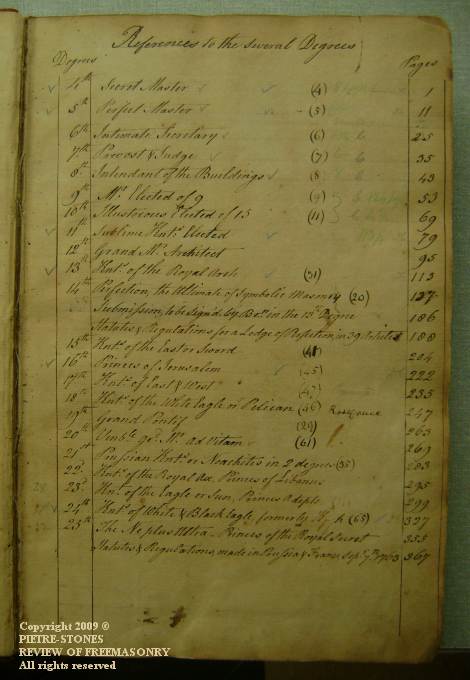 On
October 29, 2009, Bruno Gazzo, editor of PS Review of Freemasonry received three
emails from a gentleman calling himself Naveed Ahmed from Lahore, Pakistan: On
October 29, 2009, Bruno Gazzo, editor of PS Review of Freemasonry received three
emails from a gentleman calling himself Naveed Ahmed from Lahore, Pakistan:
"I
recently acquired a manuscript with few other freemason object looking for more
information on the manuscript attaching a small video. The red seal bears the
text alexander deuchar seal engraver to his Majesty with the number 107. I will
be happy to answer any question and send pictures or more videos."
"its
number 107 from alexander deuchars library. I am trying to get
a digital camera so will try to send you better pictures for now I only
have my cell phone to take pictures and videos. So far i have only been able to
find out that it was corrected or updated by whymper in 1888 and was in deuchars
library besides that its origin remains a mystery to me."
"and
I have a few leads from the net that this might be a manuscript by henry andrew
francken."
The
alleged Naveed Ahmed possibly had read the paper Estienne
Morin et l'Ordre du Royal Secret published in French on Ps Review of Freemasonry and written by Ill. Bro. Alain Bernheim 33°. Bro. Bernheim writes: "Enfin un autre MS portant
l’ex-libris d’Alexander Deuchar se trouverait aux Indes à Lahore. Son
existence a été mentionnée par Lindsay mais aucun chercheur ne semble avoir
eu l’occasion de l’étudier. "
Bro. Bernheim
refers to the book, The Scottish Rite for Scotland (1958), where Ill. Bro.
Lindsay mentions p. 73 a Francken manuscript " in the personal keeping of
the District Grand Master of the Punjab under the United Grand Lodge of England
and Wales on behalf of his District Grand Library at Lahore which has Deuchar's
book-plate on the inside of its front cover".
Alexander
Deuchar (1777 – August 12, 1844) was a seal engraver and Lyon Herald at the
Court of the Lord Lyon (the authority for heraldry in Scotland and revived the
Templar tradition in Scotland in the early 19th Century in order to establish a
new form of chivalry. Arthur Edward
Waite in New Encyclopedia of Freemasonry 1921 writes "In 1811-1812,
Alexander Deuchar, Eminent Commander of Edinburgh Encampment, No 31, under the
Early Grand Constitution, established what is termed a schismatic body with the
style and title of the Supreme Grand Conclave of Scotland. He is said to have
assumed the Office of Grand Master for life, notwithstanding the displeasure of
his associates. The Conclave appears to have been moribund in 1830. In 1836 it
was remodelled, vacating its Masonic position and admitting non-Masons to
membership, including the Bishop of Aberdeen and the Duke of Leeds."
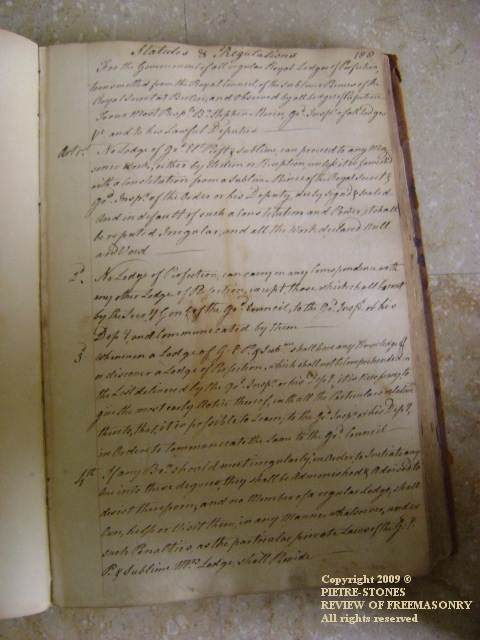 Henry
Josiah Whymper (1845-1893) was an active Freemason in India and a member of
Quatuor Coronati Lodge from January 6, 1888, Whymper is remembered today for his
reproduction, in facsimile of the Regius MS. According to H.R.H. the Prince of
Wales, "He was a man of mark in and out of Masonry, a Companion of the
Order of the British Empire, a Masonic Savant and a practical Mason."
Henry
Josiah Whymper (1845-1893) was an active Freemason in India and a member of
Quatuor Coronati Lodge from January 6, 1888, Whymper is remembered today for his
reproduction, in facsimile of the Regius MS. According to H.R.H. the Prince of
Wales, "He was a man of mark in and out of Masonry, a Companion of the
Order of the British Empire, a Masonic Savant and a practical Mason."
In
the Transaction of Quatuor Coronati Lodge 2076 EC, Vol. 6 for the Year 1893,
Bro. W.J.Hughan writes an eulogy about Whymper:
Bro.
Whymper was only born in 1845, and was not initiated in the Lodge Mayo, No.
1413, Rawal Pindi, Punjab, until 1872, so that, comparatively speaking, ha was
young in the Craft to many of us. Whatever he lacked in age, however, he made up
in energy, determination, and persistence in high well-directed researches.
Though for some years his Craft
studies were unknown to us in England, from 1887 we have been kept fully
informed as to the character and extent of his labours on its behalf. He was one
of the founders of Lodge No. 1448,
Murree, in 1873, and its W.M. in 1877, also a founder of the Stewart Lodge, No.
1960, Rawal Pindi and Murree, in 1881 ; likewise of the Prince Albert Victor,
No. 2370, Lahore — a Past Master's Lodge — formed on similar lines to
Quatuor Coronati Lodge No. 2076, London, for which our friend laboured
most assiduously, and was very pleased to take part in its successful start. On
the 6th January, 1888, the literary "blue ribbon" of lodge membership
was conferred on him by his election to the " Inner Circle " of the
Quatuor Coronati Lodge.
The
high office of District Deputy Grand Master of the Punjab was bestowed upon him
in 1884, and after a brief retirement he again held that office in 1892 and 1893
to his regretted decease on Thursday, 27th April, at Bombay.
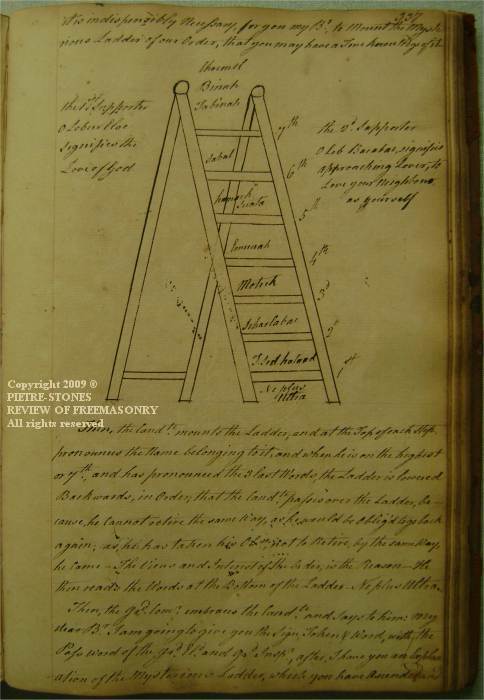 His
retirement was announced at the District Grand Lodge on October 28th, 1892, over
which he presided as Deputy ; the sad news being received with deep sorrow and
regret throughout the whole of the District, particularly so when the
keen disappointment to himself and his many friends was due to ill-health
necessitating such a step. His successor, Col. C. F. Massey, who was installed
in due course (patent dated November 2lst, 1892), referred most
appreciatively to Bro. Whymper, " who had for years devoted all his
spare time and a good deal of his money to the formation of a Masonic library,
..... he is not merely a collector, he is also a deep reader, and an excellent
writer".
His
retirement was announced at the District Grand Lodge on October 28th, 1892, over
which he presided as Deputy ; the sad news being received with deep sorrow and
regret throughout the whole of the District, particularly so when the
keen disappointment to himself and his many friends was due to ill-health
necessitating such a step. His successor, Col. C. F. Massey, who was installed
in due course (patent dated November 2lst, 1892), referred most
appreciatively to Bro. Whymper, " who had for years devoted all his
spare time and a good deal of his money to the formation of a Masonic library,
..... he is not merely a collector, he is also a deep reader, and an excellent
writer".
Other
appointments and honours bestowed were so numerous that they cannot well be
described herein, save one or two of the more prominent ones, which be highly
valued, such as District Grand H. of the Punjab (being P.Z. Stewart Chapter, No.
1960), and 32° in the Ancient and Accepted Rite of England and Wales, which was
recently conferred and was a source of great gratification to him. ...........I
do not think of the thirty or less members of the Lodge any of us thought more
highly of the honour than he did, and the fact of his membership was usually
announced in the works and pamphlets he issued since his election. It is but
bare justice to add that no Lodge will feel his removal from their midst more
than the members of No. 2076, each of whom recognised him as a most devoted
Craftsman and zealous student, and several loved him as their dear friend and
fellow labourer..........
To
briefly refer to Bro. Whymper's literary achievements in relation to Freemasonry
is far from easy, though a very pleasant duty to perform. His handsome
reproduction of the celebrated " Regius MS.," in fac-simile, was his first important work. His able Introduction to which
was both appropriate and opportune.
The
next volume from his prolific pen was in 1888, and entitled " The Religion
of Freemasonry," edited by the indefatigable Bro. G. W. Speth, with an
introduction by me. The editor discharged his duties with marked ability,
especially under the circumstances, as the author had to return to India before
the MS. was properly arranged. It is an extraordinary book in many respects,
exhibiting considerable research, originality of treatment, and abundance of
facta concerning the " burning question " (in India) of Christian or
Cosmopolitan Freemasonry.
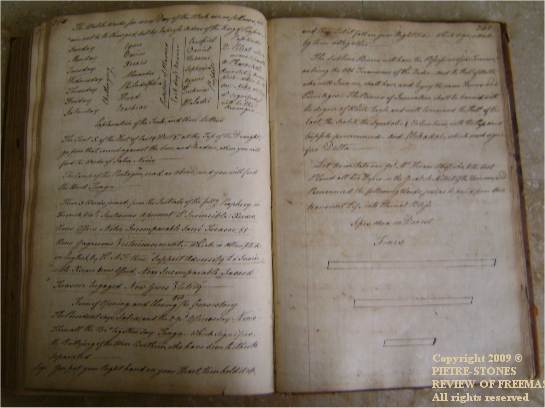
In
1889 was issued, in pamphlet form, "Articles on the Constitutions of
Freemasonry, by Bro. W. J. Hughan, P.G.D., privately printed for Bro. H. J.
Whymper.
He
also delivered a number of interesting lectures, beginning with one on Masonic
Literature before the District Grand Lodge of the Punjab, December 27th, 1888,
which was printed in the Transactions, as also another September 8th, 1891 (when
held at Murree) on " The Constitutions of Freemasonry " (MS. and
printed), when he was warmly thanked for " his valuable and interesting
address."
An
able paper was read by our friend at the meeting of the Prince Albert Victor
Lodge, No. 2370, on January 31st, 1891, on "Catalogues and
Bibliographies," which has never been excelled, and he there and then
exhibited his valuable Catalogue, in manuscript, of
Masonic Books in the English language; ordinary by-laws of lodges, etc.,
being excluded, and the proceedings of each Grand Lodge being counted as one
volume. The title-page extended to some 8,000 articles......Bro. Whymper has
been at this great work for several years, assisted by several of his
collaborators in this country.
Two
other remarkable publications should be noticed, viz., his reprint of "
Acts of Parliament referring to Freemasonry," (a.d. 1799 and 1817),
dedicated to Bros. Major Bowles and Capt. Leslie, intended as a reply to the
Rev. Father Waterhouse ; and a smaller, but most valuable, volume (also in 1892)
on " Early Printed Literature referring to Freemasonry," which
contains accurate reproductions of the salient portions of Randle Holme's "
Academy of Armoury," 1688 ; Dr. Plot's Staffordshire, 1686 ; Elias
Ashmole's Diary,1717.
His
numerous articles in the " Indian Masonic Review" and elsewhere I must
not now stay to allude to, nor the
exhibition of Masonic Books and MSS., etc., which he so thoughtfully provided
for his brethren in India. ......The "Punjab Masonic Institution " has
lost in him one of its largest contributors and most constant supporters. Words
fail me to express my feelings and affection for our noble brother deceased, I
can only hope that the memory of his goodness will abide with us, and prove
stimulative to us all.
There
is no doubt: the Manuscript in possesion of the Pakistani gentleman is the lost
copy of the Francken MS that was in the District Grand Lodge of Punjab Library at Lahore and
that was first owned by Alexander Deuchar and then by Henry Josiah Whymper.
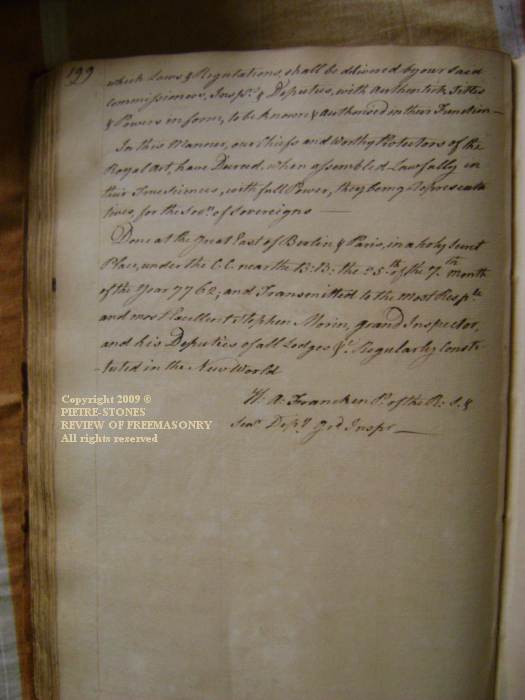 This
is the major masonic discovery of the 21th century.
This
is the major masonic discovery of the 21th century.
Mr
Naveed Ahmed tells us that he is not a Mason as Pakistan islamic law forbids
Freemasonry, but that his father was
"My
father to the best of my knowledge was a member at the Prince Albert Victor
Lodge No 2370 EC".
Curiously
Ahmed is also in possession of the original warrant of Prince Albert Victor
Lodge No 2370 EC. signed by Colonel Shadwell H. Clerke, Grand Secretary of the
United Grand Lodge of England 1880-1891, Edward,
1st Earl of Lathom, Deputy Grand Master of the United Grand Lodge of England
1874-1891, and Albert Edward, Prince of Wales (afterwards King Edward VII).
Grand Master of the United Grand Lodge of England 1874-1901.
Mr
Naveed Ahmed states to the Editor:
"The
copy of the Francken MS was bought from the son of a late bro Mason in Lahore.
He asked me for my help in selling of some rare masonic items which his father
had collected over his life time, I offered to buy the complete
collection."
At
the present moment, only three Francken MSs are known to exist as Ill. Bro. Alain
Bernheim 33 ° writes: "The most well-known one is dated from 1783, it is
presently in Lexington, in the Library of the Scottish Rite Northern Masonic
Jurisdiction (NMJ). An older one was re-discovered in England in 1976, it is
dated from 1771 and is in the Library of the Supreme Council for England and
Wales in London. A third one, undated, was rediscovered in 1983/4.
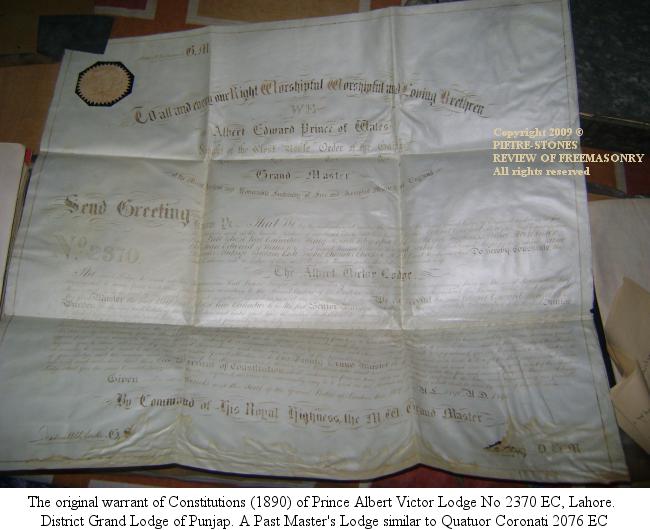
|
![]() News Feed |
News Feed |  Subscribe News by Email
Subscribe News by Email